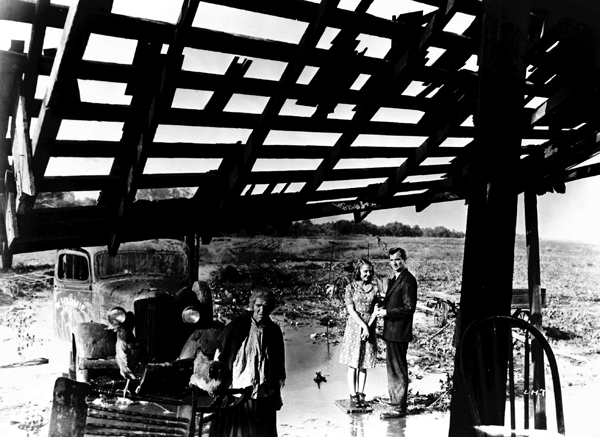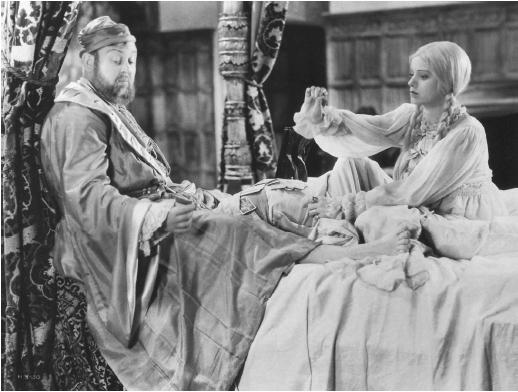Our Town (1940), was directed by Sam Wood (director of many a Hollwood classic, from the Marx brothers vehicle A Night At The Opera, to Gone With the Wind, although he was uncredited for the latter), and based on a Pulitzer Prize-winning play by Thornton Wilder. The film is set in a small New England town, beginning at the turn of the 20th century, and tells a simple tale of community spirit, and the blossoming love between two neighbours. In this New Hampshire town, everybody knows everybody else's name, the milkman lets himself into the house to deliver his milk, and "a dog could lie in the middle of Main Street all day without being disturbed".
Life in The Southerner (1945) is a little different. The great French director, Jean Renoir (son of the artist, Pierre-Auguste Renoir) directed the film a few years after fleeing Nazi-occupied France and becoming an American citizen. I have come to the conclusion that Renoir is the greatest director who ever lived (an opinion shared by Orson Welles, although if pushed, Welles may well conclude that he himself is the greatest director who ever lived!). This is the man who, in a two year spell, made The Rules of the Game, La Bete Humaine and The Grand Illusion- all masterpieces, with the former and latter being in the discussion for greatest film ever made. His films are known for their exploration of class differences and human desires, are imbued with a rapier wit, and shot with elegance, making great use of mise-en-scene and location to accentuate the themes at play. The output from his period in Hollywood is considered mixed, and this is the first of his American films I have seen.
The Southerner is, of course, set in the American South (although the state is never mentioned) where a poor cotton picker and his family attempt to branch out on their own, turning a small piece of land into a home and a working farm. In comparison to Our Town, this is a bleak film, showing the hardships involved in rural living. The central family, the Tuckers- Sam, wife Nona, two young 'uns, and the caustic Granny (Bondi), meet many obstacles in their pursuit of the American dream, including a surly neighbour, illness, and a cataclysmic storm.
%20DVD%20Review/Southerner_Poster.jpg) It is not without sentimentality though. Indeed, the Tuckers are one of those honest, hardworking families which always band together during a crisis, knowing they can overcome anything with the strength of their love. This is something of a Hollywood staple, and becomes somewhat cloying in a film which is effective in creating the appearance and feel of a dirt-poor Southern town, rife with difficulties.
It is not without sentimentality though. Indeed, the Tuckers are one of those honest, hardworking families which always band together during a crisis, knowing they can overcome anything with the strength of their love. This is something of a Hollywood staple, and becomes somewhat cloying in a film which is effective in creating the appearance and feel of a dirt-poor Southern town, rife with difficulties.If The Southerner is prone to moments of sentimentality, Our Town is positively teeth-rotting in its sweetness. Right from the opening scene, in which a kind-faced elderly man, leaning on a gatepost, introduces us to the town, its people and its way of life, this seems less like a film and more like an elongated bread commercial. Contrast this to the opening scene of The Southerner; an elderly man dies from exhaustion in the cotton field. In this early sequence, we meet the key players in the film, and get lessons about the town from local historians (when one man gives the town population, our narrator whispers in his ear that Mrs. such-and-such has just had twins, causing the man to add two to his total with a friendly smile). It's all rather nauseating, to be honest.
The central characters are young Emily Webb and George Gibbs. Emily is played by Martha Scott, reprising her stage role, and getting a best actress Oscar nomination in the process. George is played by William Holden in just his third credited role. Both are fine, although Scott, in her late twenties at he time, is very hard to buy as a school-girl. The two kids tiptoe around each other, Emily dedicated to her studies, and unsure of whether she holds any allure for the opposite sex, and George, shy and somewhat awkward, an underachiever at school who just wants to work on his uncle's farm.
 |
| Love's young dream: Scott and Holden |
To be fair, there are some diversions down relatively less-wholesome avenues, for example, the local choir master is a noted drunk, and we later find out, after jumping forward in time, that he ended up killing himself. This is an interesting aside that is unfortunately left unexplored. Later on, we get alarmingly close to tragedy, when Emily is taken sick whilst about to give birth. This gives rise to an inexplicable sequence in which Emily "dies", and her spirit travels back in time to visit her family when they were all younger. She ruefully laments the passage of time that has separated the family, as well as the fact that they never really made time for one another, something which doesn't really jive with the rest of the film. Anyway, she isn't really dead, just feverish, and wakes with a healthy child to resume her life on the farm with George.
 |
| Renoir frames the American South |
Eventually, the two work something out (strangely enough, an agreement based on the capture of a legendary catfish, which sounds like a plot that wandered in from another film, but just about works), and things seem to be on the up for the Tuckers. Their crops are doing well, and a wedding brings the whole family together for a party which comes as a nice change of mood in the largely bleak film. Then the storm moves in.
The central conflict in the film, above all else, is between Sam's simple dream of owning his own land, and the lure of the factory, represented by Sam's friend, a city man who says he can get Sam a well-paid job with him. After the storm detroys all of his hard work, Sam finally gives in, decides that he can take no more of living at the whim of the earth and the sky, and accepts the job. But, in true Hollywood style, it is when at his lowest ebb that Sam learns what is really important, as he returns home to find his wife, children, and even Granny, have fixed up the place, and are positive about the future. It's an ending which brings to mind It's A Wonderful Life, in it's message to never underestimate the decency of people. More than that, the message is that the love of a family, combined with hard work, can make anything possible.
There is a conflict throughout The Southerner, between a film which really wants to portray the realities of life for a poor farming family in the South, and a film which wants to celebrate the spirit of hardworking American people. I'm sure Renoir fought for a bleaker film, but compromised with the studio over the more Hollywood-ised aspects. It makes for a somewhat uneven, but nonetheless enjoyable film. Zachary Scott gives a fine performance as the dedicated Sam, and I especially enjoyed the performance of Betty Field as his supportive wife. Both are somewhat stereotypical characters, but the actors bring life to each of them. The grumbling Granny would be easy to dislike, but I thought Bondi brought some genuine humour to the film.
Renoir was given a Best Director nomination in a ridiculously strong field (Hitchcock and Wilder, who won, were also nominated), and brings a lot of class to the proceedings, particularly in his depiction of the American landscape. It's funny how many great films about American life have been made by foreign directors, but that's maybe a subject for another day. There is a realism and truth to this film which shines through, and it fits nicely into the director's oeuvre. 4 stars.
Our Town isn't a bad film, but I can think of absolutely no reason to recommend it. I suppose it does have a certain quaint charm to it, and fans of Holden may be interested to see him playing a much different role to what he would become known for. What baffles me is that this film was nominated for a Best Picture Oscar, losing out to Hitchcock's Rebecca. Despite a few capable performances, and bits of nice scenery, there's really nothing to see here. 2 stars.
I'll be back soon with another new review, but until then, here's looking at you!








